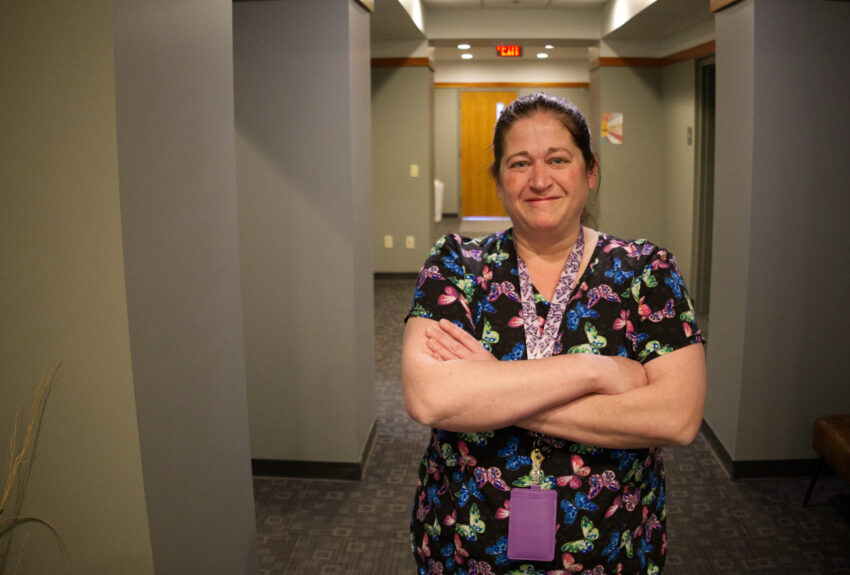Welcome to One Team, where we highlight standout members of Citizen Advocates’ 800-strong team, stretching from Lake Champlain to Lake Ontario.
After 15 years working at McDonald’s in Malone, North Bangor native Kamie O’Connor decided it was time for a change. “I wanted to help others,” she said—a goal that led her to become a Licensed Practical Nurse and eventually earn her Registered Nurse credentials. In 2018, Kamie joined Citizen Advocates’ pioneering 24/7 Crisis & Recovery Center as a floor RN. She advanced to team lead and continued in that role when the center moved to its current location at 125 Finney Boulevard, becoming the Malone Behavioral Health Urgent Care Center.
For the past year, Kamie has served as Associate Director of Nursing for Citizen Advocates’ three behavioral health urgent care centers in Malone, Ogdensburg and Watertown—driven by her passion for supporting nurses who care for individuals in crisis. Below is her story in her own words.
Day-to-Day Work
You work both on the floor and in a supervisory role—how do you balance those responsibilities?
I think it’s important, as an associate director, to be on the floors, too. In Ogdensburg, Watertown or Malone, I work side-by-side with the nurses at our behavioral health urgent care centers. If you expect someone to do something, it’s important that you can do it just as well.
I like having a caseload; I like staying busy. I’m not one for downtime.
Citizen Advocates’ behavioral health urgent care centers are open 24/7 to walk-in patients. What does a typical day look like for you?
On a typical day, I check in with each of my team leads to see if they need anything. I do some educations with each department. I check in with nurses working each shift at each of our 24/7 locations. There are lots of meetings and patient reviews, some recruitment, and payroll and administrative work.
If there’s downtime and I’m off the floor, I’ll assist with any walk-ins. Our busiest time of day is usually 3 to 7 p.m. when folks are getting out of school and work.
How does the environment of behavioral health urgent care differ from other nursing settings?
It’s a family-like environment. Everyone works together as one team to find solutions that support each person’s goals. Instead of working in silos, we collaborate side by side—with targeted case managers, psychosocial rehabilitation specialists, peers, nurses, providers and therapists all playing a role in each patient’s care.
Leadership & Impact
How do you connect with your staff at three behavioral health urgent care centers hours apart?
It might sound a little unusual, but I started a buddy system. I created a group chat for the midnight staff from all three of our behavioral health urgent care centers. If someone has a question, they can reach out to nurses at the other centers who are also on shift. Most of the time, it’s a simple question—they might just be second-guessing themselves and need a little extra support.
It’s a great way to build rapport across the whole team. For example, when I’m out of the office, Watertown nurses might come to Malone to help fill gaps in the schedule. Ogdensburg nurses do the same and Malone staff return the favor. I love it—I’d much rather see us working together than operating separately. You don’t see that kind of cross-clinic teamwork in too many places.
I’m also always available to the team, day or night—even when I’m not on-call. They know they can reach out with any questions or concerns, and I’m quick to respond—sometimes maybe too quick. [She laughs.]
Can you share a patient success story that has stayed with you?
There are so many. The Malone nurses saved a patient’s life in the parking lot. That was obviously a huge success. But anytime someone comes through our doors, and we give them the resources they need—that’s a success.
It’s such a big deal that our crisis residence programs allow patients to leave during the day and come back at night. You can keep going to work or school, see your family, all while working on yourself. It makes it so that folks who are struggling with a mental health or substance use crisis aren’t also struggling with a financial crisis by missing work.
Words of Advice
What advice would you give to nurses considering a career in behavioral health?
You’ve got to be professional, empathetic and respectful. You have to meet people where they’re at. You cannot have any judgement. It’s the golden rule: treat someone how you’d want to be treated.
I couldn’t see myself doing anything else, honestly. When I’m here it feels like I’m home. You go home feeling good at night because you’ve made a difference in someone else’s life.
What do you do for fun outside of work?
I spend as much time with my four kids and my husband as I can. I love planning vacations and fishing. Bass fishing at the Fort Covington marina—that’s the best.
If you’re interested in learning more about a nursing career at Citizen Advocates, visit citizenadvocates.net/nurse.


 Previous Post
Previous Post


